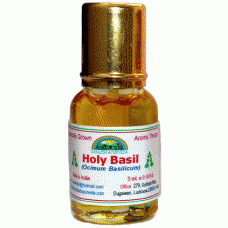Your shopping cart is empty!
Holy Basil (Ocimum basilicum) 5ml
Price: 12.00€
Qty:
|
Mosquito Plant of South Africa.
Ocimum Basilicum and Ocimum Sanctum |
|
Family: Labiatae
International Name: French-Basilic Cultive; German-Basilien Kraut; Persian-Pharanjamuskh, Firanj-mushk;Arabian- Shahasfaram. Ayurvedic Name: Sanskrit- Bisva Tulasi; Varavara; Manjariki; (seeds:Rehan), Vishnu-priya, Divya; Bharati; Krishnamul, Hindi-Babui; Tulsi; Sabzan, Kala-Tulsi, Baranda, Shyama Tulsi and Rama Tulsi. |
| Habitat: (a) Indigenous to Persia, South Asia, North Africa, far and Middle East. Commonly cultivated for commercial purposes in central south Europe, subtropical America and Plains of India. Cultivated near Hindu houses and temples. (b) Sweet Basil in a herb grows as small annual shrub. Needs proper care, enough water and favorable warm atmosphere to grow. |
| Part used for getting oil: Herb. |
|
History: Basil is a Greek word, which is short form of “basilikon phuton” literally means “kingly herb”. Ocimum means “to smell”.
This herb has a strong pungent aroma which comes out from the herb. It is attractive and refreshing. Leaves have heart shape thats why considered as a symbol of love by Southern European people. It is important part of the Chinese, Tibetian, Unani, Persian and Japanese medicine. In India Basil has been loved by Lord Krishna. Thats why known as Vishnu-Priya. (loved by Vishnu). This plant in a part of Hindu Religion. Vashnava Hindus grow it in their Garden, Courtyard, at the Gate, In Lawns, even in apartments in clay pots, around Temples etc. Hindu Vashnava worship it every day, early in the morning after that, worship Lord Krishna. It is said that Lord Krishna wanted to get Tulsi Plant worshipped before him. It is main ingredient of the “Charna Amrita” a liquid nector offering from the feet of the God. Charna Amrita which contains Tulsi leaves, Ghee, Milk, Yoghurt, and Honey. It has been distributed among devotees after worship. It is said that to protect his devotees from several diseases and for their long life, health and happiness. Lord Krishna wanted that Tulsi leaves should be offered to him as a part of his worship and taken every day by the devotees. For Hindus, Basil is a sacred herb. Everyday in the morning, a Hindu wife in her daily routine brings holy water (which is already offered to God) near Basil plant. Take seven circles around tree and pour water to the soil supporting Tulsi Plants. After that pray for the health and happiness of the family members as it is believed that Holy Basil protects the spirit of the family. It is a magical healing herb loved by not only human beings but also Gods. Its name has been called with the name of God in Hindu and Ayurvedic medicine. There are main two botanical varieties found (a) Sweet Basil- Ocimum Basilicum which is known as Shayama Tulsi due to its blackish green color of leaves. Shyama means darker color. It is also one of the name of Lord Krishna who was black colored. It has strong Aroma fragrance mainly used for distillation of oil as it has more contains of oil. (b) Holy Basil- Occimum Sanctum which is known as Rama Tulsi due to its green color. Its leaves do not have blackishness and only dark green in color. Here word Rama represents Lord Rama who was white in color. It has mild aroma and used mainly for worship. Often the essential oil we get in the market is the mixture of both of them. |
|
Source and methods for getting oil: Distillation of the flowering tops and leaves.
|
|
Constituents of the oil - Alcohol: Contain a yellowish green essential oil made, off linalol, ketones, borneone, Camphor, Cineole, Phenols, Methylcha vicol, lugehol, Terpenes, ocimene, pinene, sylvestrene.
|
|
Action: Diaphoretic, carminative and stimulant, demulcent, aphrodisiac and diuretic, fragrant and aromatic, anthelmintic, febrifuge. Antidote to snake-poison, has a pungent taste.
|
| Aroma of the oil: Pungent Aroma which has clove like odor. |
|
Uses in Ayurveda:
• Mainly used in Ayurveda as Nirvine tonic. It is also good for mind as it cleans the mind and stimulates it. • Those who feel depressed or motionally unhappy should put 1 drop basil oil in 600 ml clean water divided into four parts and drink it four times a day. • It should also be smelled or put in the cloth or handkerchief or burned in the perfume lamps for getting results. • In Malaria Fever - 1 drop has been put in a cup of water and given thrice daily. • It is useful in migraine, headaches, digestive problems chest infection etc. |
Write a review
Your Name:Your Review: Note: HTML is not translated!
Rating: Bad Good
Enter the code in the box below:


